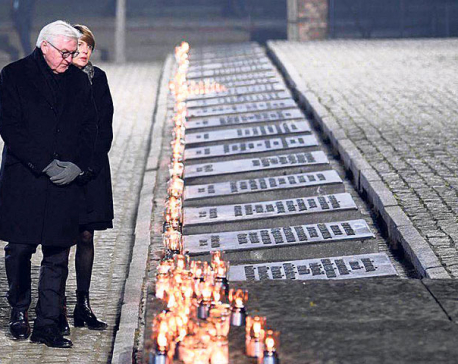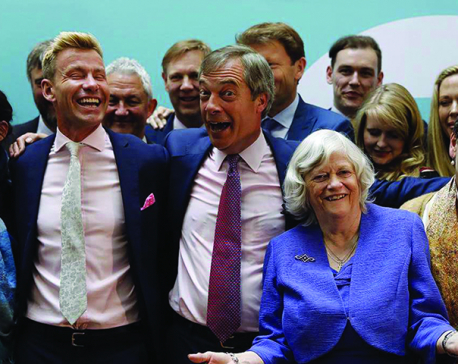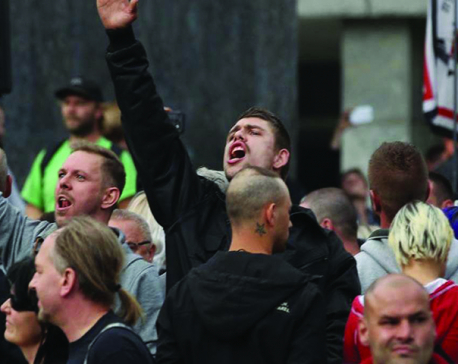
OR

More from Author
Nationalism is the highest priority for Nepal but our rulers and political actors are using and abusing it as the political weapon to get into and remain in power
Following the surprising result of the UK’s referendum to leave the European Union in June 2016 and as astonishing victory of Donald Trump as the President of the US in November 2016, nationalism and populism has become the subject of dominant political discourse across the world. After the end of Cold War, dissolution of former USSR in 1990 and the fall of Berlin Wall in 1989, liberal principles and values—liberal democracy, liberal economy and liberal nationalism—had remained popular and predominant political system, until 2016.
Liberal democratic systems had replaced all kinds of communist, authoritarian, dictatorial, totalitarian and despotic regimes after the 1990’s global democratic wave. Consequently, the West (American and European continent that believe in liberal principles and values and champion of democracy) and liberal democratic political parties and political scientists explained that dissolution of Soviet Union and the end of Cold War as the failure of communist and authoritarian regimes, and victory of liberal democratic system.
In his much-debated 1992 book The End of History and the Last Man proponent of liberal democracy Francis Fukuyama compared dissolution of USSR and the fall of Berlin wall as the end of communism and authoritarianism regimes for good. He comprehensively argued that the two events marked victory of liberal democracy over communism and authoritarianism regimes and that there is no alternative to liberal democracy in the 21st century.
Emergence of populism
The recent unexpected surge of nationalism and populism (both right-wing and left-wing) across the world has raised questions with regard to future of liberal democratic system than ever before. Rise of these two phenomena has posed serious threats to liberal democracy and liberal and civic nationalism.
In fact, ever-evolving trends of populist and right-wing nationalism have raised equally serious threats to liberal democracy, pluralist and diverse society, and the existing post-Cold War liberal and democratic world order. The populist nationalism is the antithesis to the civic or liberal nationalism. Therefore, liberal democracy, pluralism and diverse societies are facing an existential crisis because of the rising global populist tide. Even the advocates of liberal democracy have admitted that liberal democracy and nationalism are under threats of populism.
The populists try to divide, polarize and rule the country based on political ideology, religious faith, cultural and social identity, caste, race, color and ethnicity to serve their political interests and to get into power. But this is disastrous for political, social and religious harmony. When the populists take over, they attack democratic institutions, constrain the independence of the judiciary, curtail press freedom and limit the autonomy of civil society organizations. Populism favors mono-culturalism over multiculturalism, national interests over international cooperation, closed borders over the free flow of peoples, and traditionalism over progressive and liberal social values.
Global context
The West is considered as the motherland of liberal principles and values, freedom, rule of law, human rights and globalization. Paradoxically, the West itself has become the breeding ground of nationalism and populism today. It is an irony that the West has become the fertile land for nationalism, populism and anti-globalism at the moment.
US President Trump, Chinese President Xi Jinping, Turkish President Recep Tayyip Erdogan, Russian President Vladimir Putin, Indian Prime Minister Narendra Modi, Hungarian Prime Minister Viktor Orban including other populist and rightist leaders have used nationalism and populism to rise to power. All of them succeeded in winning the elections in the name of nationalism and populism. Even fascist dictators like Adolf Hitler of Germany, Benito Mussolini of Italy, Augusto Pinochet of Chili, Josip Tito of former Yugoslavia, Francisco Franco of Spain and Hugo Chavez of Venezuela had abused nationalism as a weapon to get into power.
As a result, the rightist, illiberal and conservative parties are becoming popular and liberal democratic and centrist parties are becoming unpopular across the world. The populist waves are quite popular in European countries like France, Germany, Italy, the Netherlands, Austria, Poland and the UK. Some of the populist leaders have won the elections. Others have gained a significant political mileage.
Populism is basically of two types—right-wing and left-wing. And it is growing both on the right and the left. The right-wing populism is much popular in Western democratic and developed countries and it has gained greater success in many of these countries. On the one hand, the center-right parties are shifting to the right to secure their political existence in response to populist infiltration in their constituencies. The center-left parties, on the other hand, have moved further to the left for the sake of their political survival. As a result, the liberal democratic and centrist parties are becoming weak and unpopular mainly owing to popularity of the right and left-wing populism.
Nepali context
Given Nepal’s geopolitical and geostrategic location—sandwiched between the two giant nuclear and emerging global powers India and China—nationalism is a quite popular political lexicon in Nepal. The repeated Indian blockades have posed serious threats to Nepal’s national interests and national security. Taking into serious consideration the Nepal’s political and geopolitical realities, national unity, territorial integrity, people’s sovereignty and national interests is the supreme priority of Nepal for any government, ruler and political party. Nationalism, therefore, is the highest priority for Nepal.
But the governments, rulers and political actors in Nepal are merely using and abusing nationalism and populist nationalism as the political weapon to get into and remain in power. The Rana and royal regimes played the nationalist and populist card to safeguard their authoritarian regimes. In fact, they ruled the country for centuries in the name of nationalism, while suppressing people’s democratic and sovereign rights.
King Mahendra strategically used the nationalist card in 1960 to take over power by scrapping the democratic constitution and dissolving the democratic system in the name of nationalism and imposed the authoritarian regime. The dictatorial Panchayat regime survived for 30 years by invoking xenophobic nationalism.
Like his father, King Birendra also used the same card of xenophobic nationalism to safeguard his regime until 1990. Ultimately, the despotic monarchial system was brought to an end following the popular movement, and the democratic system was established in 1990. Even King Gyanendra, who became the King following the mysterious royal carnage of 2001, abused and misused ultra-nationalist and xenophobic card to take over power unconstitutionally in 2005 by undermining democratic system and sideling political parties.
The Ranas and Shahs ruled the country in the name of nationalism for centuries, but did not make any contribution to safeguarding nationalism, national interests, people’s sovereignty and national security despite protecting national border of Nepal and their regimes. Not only the Ranas and Shahs, but mainstream parties like ruling Nepal Communist Party and Nepali Congress have also been using and misusing the populist and nationalist cards as per their own political interests and convenience, time and again, in the given context.
In fact, the victory of Left Alliance in the last elections was the victory of populism and nationalism. Prime Minister K P Oli is championing populism and illiberal nationalism with the much-hyped sugarcoated mantra of prosperity.
Nationalism and populism became more dominant agenda than ever before since the 2015 blockade that India imposed on Nepal following the promulgation of new constitution through democratically-elected Constituent Assembly. Indian blockade seriously undermined Nepal’s nationalism, sovereignty, national security and national interests. Consequently, nationalism became established as the dominant contemporary agenda.
Conclusion
Populist nationalism is on the rise in the national and global context because of the failure of economic liberalism and globalization. There is a democratic deficit within the liberal democratic system and the populists have been trying their level best to take political advantage from that deficit. Any governance system should deliver as per the expectation of the people but the government should be democratic, participatory and accountable to the people. The populists are attacking democratic principles and values, and the very notion of plural and inclusive society using the façade of nationalism and prosperity in Nepal, like in the US, Russia, India, Turkey, Hungary, Venezuela and Colombia.
Despite its short-term setback, there is no alternative to liberal democracy, liberal nationalism, and pluralism in the modern, advanced and liberal society of the 21st century. There are some fundamental inherent problems of globalization, liberal system and liberal nationalism. Those fundamental issues should be addressed within the orbit of liberal democracy to avert the simmering crisis of liberal democracy sooner than later. Otherwise, the global wave of populist nationalism will not only dominate the Nepali politics, but also will pose serious threats to liberal democracy, liberal nationalism and plural society in Nepal as well.
Twitter: @GejaWagle
You May Like This

Geopolitics of Holocaust Memory
PARIS – The 75th anniversary of the liberation of Auschwitz by the Red Army is an occasion marked by angst... Read More...

How do populists win?
Populism can win when the “other people” are narrowly defined or simply small in number, provided that they can still... Read More...

Disruptive ethnic nationalism
The rise of radical ethnic nationalism as a response to fears of terrorism and mass migration represents a more fundamentally... Read More...







Just In
- NRB to provide collateral-free loans to foreign employment seekers
- NEB to publish Grade 12 results next week
- Body handover begins; Relatives remain dissatisfied with insurance, compensation amount
- NC defers its plan to join Koshi govt
- NRB to review microfinance loan interest rate
- 134 dead in floods and landslides since onset of monsoon this year
- Mahakali Irrigation Project sees only 22 percent physical progress in 18 years
- Singapore now holds world's most powerful passport; Nepal stays at 98th












Leave A Comment